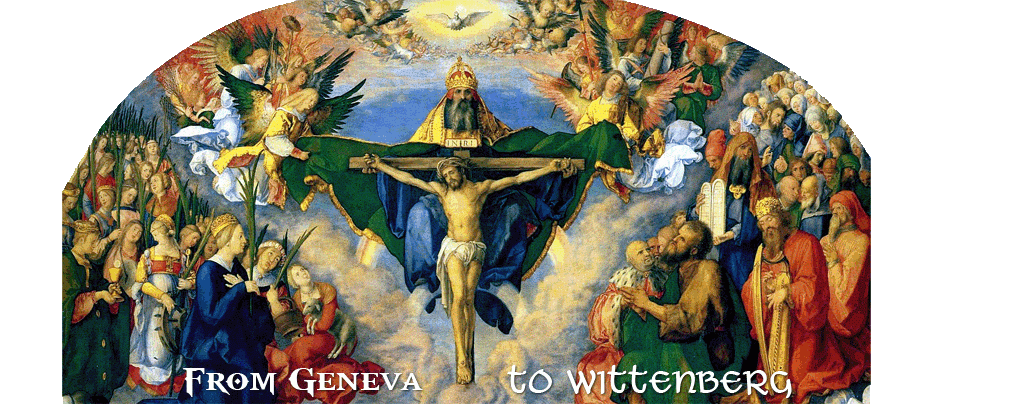Romans 8:29-30 is a battleground text in Scripture. Differing theologies interpret it differently. I'm going to try to show what the verse says and what it doesn't say here. I'll do my best.
Romans 8:29-30 (ESV): For those whom he foreknew he also predestined to be conformed to the image of his Son, in order that he might be the firstborn among many brothers. And those whom he predestined he also called, and those whom he called he also justified, and those whom he justified he also glorified.
There it is. It's a heavy passage, loaded with some big time theological words. Foreknew, predestined, called, justified, glorified. Our Reformed friends see this as a golden chain of salvation. And I think in concept they're correct here. It is certainly talking about that. Yet, I also think they push it too far as well. Our Arminian friends see this as God looking through the corridor of time and seeing who would choose Him of their own free will. This interpretation is pretty far from the mark, I think. It actually makes little sense when it is fleshed out.
I've also heard of another interpretation in the past tense that this is only referring to those who were in Christ before the book was written and after they died. Thus, those whom God foreknew would be those whom He knew in ages past, pre-St. Paul.
So then, what is it saying, and how far should we take this? How far is too far? I think it's fairly simple if we just allow this one to say what it says and not read too much into it.
It is clearly a promise of God and flows naturally from Romans 8:28, which states: And we know that for those who love God all things work together for good, for those who are called according to his purpose.
So God works all things together for good for those who love God and are called according to His purpose. And then, the promise of that is that He predestines all those He foreknows, and promises to call, justify, and glorify them as well.
So I think this verse is a very strong passage for the Lutheran dogma of single predestination insofar as it is promising that God will save all those whom He foreknows and has predestined. He promises to call them, justify them, and glorify them. If we would like, we could call these people the elect.
But what this passage does not say is anything about those who are unbelievers. It says nothing about them. So whereas we know that God promises to save the predestined people, and those are the only ones who are finally saved, it never comments at all on others. In short, this is not a congruent passage teaching that there is a group of people who are predestined to be damned. Likewise, it never says anything that these other folks will not be called by God and will never be justified. It never says God predestines them to hell.
To put it simple, the people who do not end up in glory can't say that God predestined them there for His glory, because the Bible simply does not teach that; certainly not here in Romans 8. And indeed, in other places of Scripture, God is said to "desire all people to be saved" (1 Tim 2:1-4), and that "the grace of God has appeared, bringing salvation for all people" (Tit 2:11), and "The true light, which gives light to everyone, was coming into the world" (Joh 1:9).
Likewise, looking to our predestination is foolish. Wondering if Christ died for us is also foolish, because He did. You're a sinner and a human, thus He died for you. He also elects us before the foundation of the world, but carries this election out via means of grace temporally in Baptism, the Word, and the Eucharist.
So what is the gist of Romans 8:28-30? Well, it's a blessed promise. Those predestined in Christ are saved and will be in glory. Predestination is a soft pillow for the believer in Christ. It says nothing about unbelievers.
Thus, while strongly affirming predestination, we refuse to go beyond what is written. We look to Christ and His work and gifts to us as our assurance, not our election before the foundation of the world, for that is only revealed through the means of grace that bring us faith in the crucified and risen Christ. Plus nothing.
Yes, I know, neither our Reformed friends or our Arminian friends like this line of thought. They argue that it has to be one or the other, logically speaking. But when Scripture offers us this paradox without a solution in Holy writ, we must affirm both.
Of course, Lutheranism is not against reason and logic, per se. We are simply against using it as a lens through which to build a systematic theology (Calvinism, Arminism, etc.). Where the Word speaks clearly, our answer is to be Amen! Let it be so!
Even if our feeble minds can't logically explain it or reason out way into a perfect reconciliation of texts. Inevitably, something gets twisted and denied when we do that. The Reformed affirm a predestination to hell (due to logic), and the Arminians pervert the entire meaning of predestination - not to mention the foolishness that results from rationalism of the Open Theists or the Hyper Calvinists.
Rest in Christ. Our election is in Him and is given to us objectively in Word and Sacrament.
Amen! Let it be so!

No comments:
Post a Comment